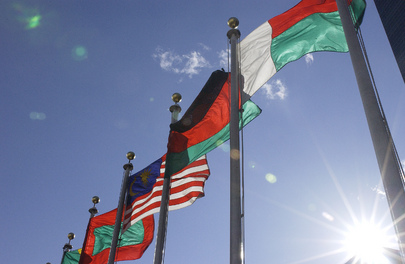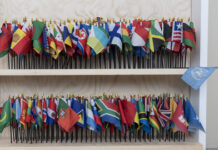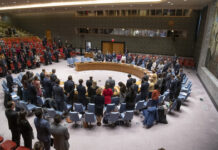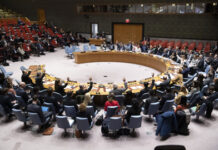This is the News in Brief from the United Nations.
Intense hostilities in Gaza continued on Tuesday between Hamas fighters and Israeli forces with a “double-digit number of children killed overnight, UN humanitarians said.
The continuing violence came despite an immediate ceasefire call for the remainder of Ramadan from the Security Council on Monday, prompting urgent appeals from aid agencies for the resolution to be respected immediately, to prevent more people dying.
The UN aid coordination office, OCHA, also urged Israel to lift its ban on aid deliveries to the north by UNRWA, the UN agency for Palestinian refugees, echoing earlier calls by the UN Secretary-General.
In Rafah, southern Gaza, UN Children’s Fund spokesperson James Elder said that 13,750 children have been reported killed, amid Israeli bombardment launched in response to Hamas-led terror attacks on Israel on 7 October.
Here’s Mr. Elder now, describing what he saw in the southern city of Khan Younis on a recent aid mission to the north:
“In my 20 years with the UN I have never seen such devastation, it’s just chaos, ruin, debris and rubble every single direction, everywhere I look, every street. It’s just utter annihilation,”
The UNICEF spokesperson reported that Nasser Hospital in Khan Younis –is now no longer operational, like two in three health facilities overall across the enclave.
Mr. Elder also described seeing people making “that universal signal of hand to mouth, desperately asking and seeking for food”, as hundreds of trucks containing lifesaving humanitarian aid remain stuck at the border in Egypt.
One in three migrant deaths linked to countries at war or with large refugee populations
One in three migrant deaths happens while people flee conflict or in places with large refugee populations, the UN migration agency, IOM, said on Tuesday.
New data from the International Organization for Migration indicates that in the last 10 years. more than 64,000 migrants have died or disappeared while moving away from conflicts and crises.
Last year was the deadliest on record, with 8,541 migrant victims. Nearly 60 per cent died by drowning.
This year’s trend is just as alarming. Along the Mediterranean sea route alone, arrivals this year have been significantly lower than last year, but the number of deaths is nearly as high, with 956 registered since 1 January.
IOM also warned that more than two in three migrants whose deaths have been documented remain unidentified.
DR Congo alert as violent clashes cause new misery in North Kivu
To the Democratic Republic of the Congo, where clashes in the country’s east have now uprooted 5.7 million people across North Kivu, South Kivu and Ituri provinces.
In an alert, the UN refugee agency, UNHCR, said that the violence has reached a devastating new level, with people forced to flee indiscriminate bombing and abuse.
As part of the humanitarian response, UNHCR and partners have provided emergency shelters to more than 40,000 of the most vulnerable people arriving in Goma, the capital of North Kivu.
Thousands of core relief kits and 1,000 tarpaulins have also been distributed to those now sheltering outside protection sites. But people are desperate, and the needs are huge, said UNHCR spokesperson Matthew Saltmarsh:
“Families continue arriving at sites traumatized and exhausted by the attacks, scarred physically and psychologically. Many report being abused – some sexually – during their flight.”
Mr. Saltmarsh called for concerted international action to address the crisis and noted that UNHCR has received just 14 per cent of the $250 million required for its response in the DRC this year.
Daniel Johnson, UN News.
Source of original article: United Nations (news.un.org). Photo credit: UN. The content of this article does not necessarily reflect the views or opinion of Global Diaspora News (www.globaldiasporanews.com).
To submit your press release: (https://www.globaldiasporanews.com/pr).
To advertise on Global Diaspora News: (www.globaldiasporanews.com/ads).
Sign up to Global Diaspora News newsletter (https://www.globaldiasporanews.com/newsletter/) to start receiving updates and opportunities directly in your email inbox for free.


































